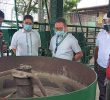The demand for jobs in the information and communications technology (ICT) sector in Davao City is expected to go up, according to Davao ICT Council chairperson Lizabel Holganza.
Holganza said the Council has been deluged with invitations from the US, for medical billing and coding jobs although she said existing skills could not yet match the increasing demand.
She said that existing medical health practitioners in the city still need to upgrade their ICD level to ICD-10 from their current level of ICD-9.
ICD is a system of categorizing or grouping diseases, injuries, conditions and procedures using specified codes assigned according to set criteria. This system is a vital requirement in the processing and renewal of hospital licenses by the Department of Health and Philhealth for all primary, secondary and tertiary hospitals.
The ICD-10 is used to code and classify mortality data from death certificates, having replaced ICD-9. The ICD-10 is copyrighted by the World Health Organization (WHO), which owns and publishes the classification. WHO has authorized the development of an adaptation of ICD-10 for the US government and all modifications to the ICD-10 must conform to WHO conventions for the ICD.
Meanwhile, there is also an expected sharp rise in the call center industry.
In a property forum of the Davao Business Process Outsourcing (BPO) on February 28, Head of the Davao City Investment and Promotion Center (DCIPC) Engineer Roberto Teo announced that the city is set to make available some 20,000 square meters for call center operations toward the end of the year.
He said the projects are in Lanang (Davao Motor Sales), J P Laurel Avenue (Robinsons Land, Inc) and on the fourth one is at the fourth floor of NCCC Mall in Matina, Davao City. He added that some call center buildings will also house its own supermarket.
Chief executive officer of the Business Processing Association of the Philippines Oscar Sanez also reported that call centers will be really big and, by 2010, it is expected that some 310 billion dollars will be outsourced in countries like India and the Philippines. Sanez says they expect 10 percent or $13 billion of this investment with about 5 percent going to Davao City. He says this means that the city needs to make available 180,000 square meters of spaces for new sites.
The property forum was held specifically to orient Davao City real property owners and developers about BPOs and give them a clear picture of the ICT industry. Holganza said they noted some interests from the property owners and are hopeful that land owners will consider investing in Davao to siphon from the already overcrowded Manila.
Sanez confirmed that they want to break the concentration of the ICT sector in the National Capital Region because it was not good for the industry. However, Teo admitted that although Davao City would be ideal place for offshoring and outsourcing, it would need still a road map to determine what the city really has.
�There is a need to conduct inventory on what Davao really has,� Teo said. He added that he would like to see investments in the light and service industry and find out if they would put up another PEZA accredited site ideal for IT Park,� he said. (CJ Kuizon with reports from PIA)










